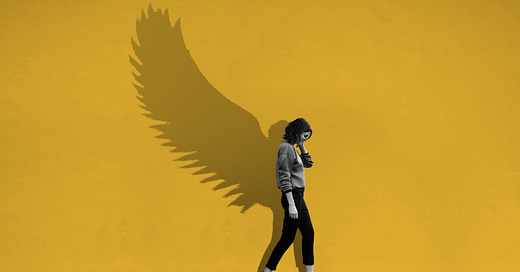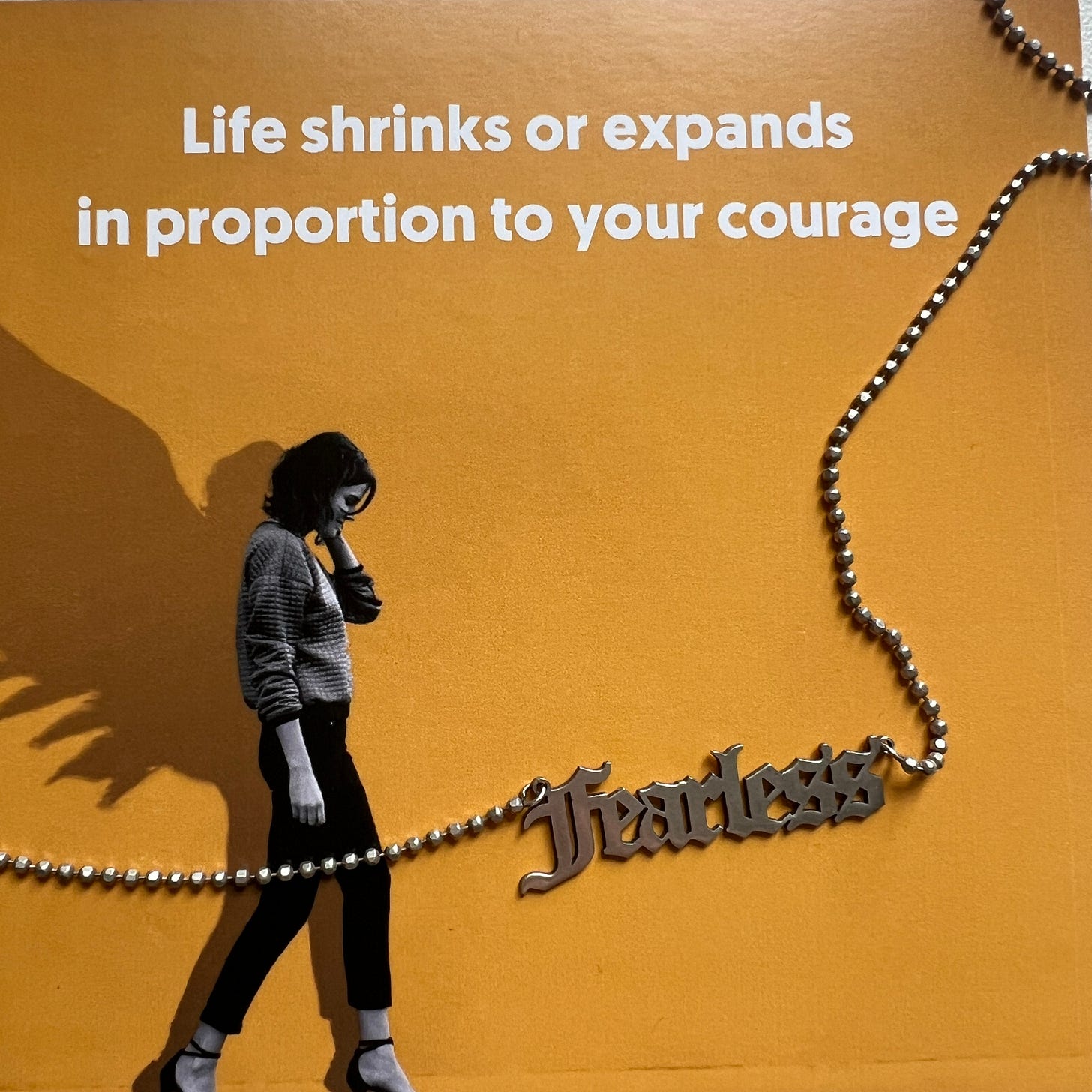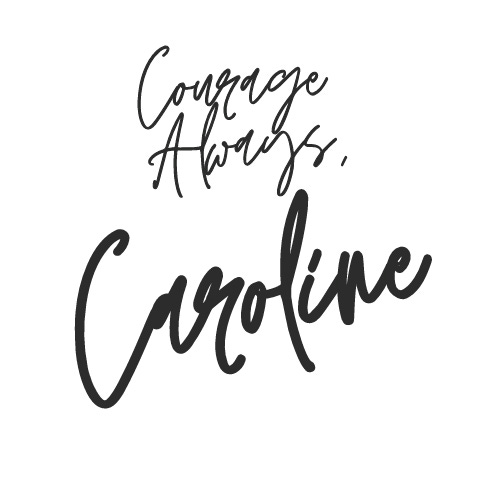I have a necklace that you will often see me wearing. One I had made for myself.
Fearless.
Bold. Empowered. Certain.
I even sold T-shirts in a Be Braver shop that read Fearless: Be Your Own HERo. It felt like a declaration of strength.
But if I were to remake them now, I’d add a hyphen: fear-less. Because that tiny dash makes all the difference.
It doesn’t reject fear, it reframes it.
It means carrying less fear where it’s no longer needed.
Less fear where we’ve grown wiser, stronger, more equipped.
Not none at all, just less.
Because none of us should wish to have no fear. Anymore than we should wish to have no joy.
We’ve Been Sold the Myth of Fearlessness
We’re told to admire the fearless. The risk-takers. The stoics. The ones who never seem shaken.
But in practising a Be Braver mindset, we offer something more human, and more honest. It’s not about having no fear.
It’s about getting to know fear, so you can choose your response.
It’s a relationship. Not a war to be battled, an enemy to be fought or a force to be resisted. I often describe fear as a frenemy. An overprotective, with good intentions but a bit behind the times with the progress of your capabilities.
Given all the brave things you’ve done to still be here today. Those challenges you overcame, disappointments you’ve weathered. Losses you’ve encountered. Opportunities that never converted.
Fear is not a condition of courage and bravery either.
Fear Has a Purpose
Fear evolved to keep us alive. It’s not a flaw - it’s data.
Fear sharpens our senses. It helps us detect threat. It helps us prepare.
But in today’s world, many of our fears aren’t about physical survival. They’re emotional:
Fear of failure.
Fear of being judged.
Fear of regret or rejection.
These kinds of fear don’t protect us. They shrink us.
Think of your career, your life, your relationships - if you truly had no fear of anything. Where would that leave you?
Who do we become when we feel no fear at all? When we lose our awareness of consequence?
Without a system to alert us to the threat of pain, regret, or loss - without a sensitivity to our darker impulses - we don’t become risk-takers. We become reckless.
Fear Is Constructed, Not Fixed
Neuroscientist Lisa Feldman Barrett teaches that emotions, including fear, are not hardwired. They are constructed by the brain based on context, past experience, and physical sensations.
That flutter in your chest? One day it might mean fear. Another day, excitement.
Fear is a story your brain tells, not a fixed truth. It’s a message.
And that means we can change how we respond.
Fear and excitement feel the same in the body, but the meaning you assign to those sensations changes your experience of them - and your behaviour.
Imagine yourself preparing to go in and present your quarterly report at the next board meeting. Asking for a payrise. Requesting a promoting. Handraising for a stretch project.
The difference in telling yourself this response is excitement at stepping in to my agency and choosing courage, backing myself and taking a calculated risk.
A pivotal study by Alison Wood Brooks, titled "Get Excited: Reappraising Pre-Performance Anxiety as Excitement," published in the Journal of Experimental Psychology: General in 2014, explored this concept.
Brooks conducted experiments where participants were instructed to reframe their anxiety as excitement before engaging in tasks like public speaking or math tests. The findings revealed that those who adopted this reappraisal strategy performed better than those who tried to calm down or did nothing.
This suggests that the practices of a Be Braver mindset, shifting how we approach situations, can positively impact performance, even though the physiological arousal remains constant.
When the Brain Plays It Safe (and Small)
Even when there’s no real danger, our brains still resist discomfort.
Psychologist Cordelia Fine, in A Mind of Its Own, shows how our brains distort reality to protect our ego.
It’ll say things like:
“You’re not ready.”
“You might mess this up.”
“Someone else is better at this.”
These aren’t facts.
They’re habits.
They’re defences, old programs written to keep you safe. But growth and safety rarely live in the same room.
Fear Isn’t the Enemy, Avoiding It Blindly Is
Here’s the crucial shift: the goal isn’t to be fearless.
It’s to be fear-les, to carry less of the fear that no longer serves you.
Psychologist Susan David describes emotions as data, not directives. It’s such a brilliant articulation for many of our thoughts and emotions.
Fear is a messenger, not a master.
It signals something. But it’s up to you to decide whether that signal is useful, or outdated.
Ask yourself:
“Is this fear still protecting me?”
“Or is it holding me back from something I can now handle?”
Fear Isn’t a Condition of Courage, Risk Is
Here’s where courage lives:
Fear and bravery are not opposites.
You can feel fear in a safe room, and feel calm in a risky one.
Fear is emotional. Risk is situational.
Bravery isn’t the absence of fear, it’s action in the presence of meaningful risk. Courage is the decision to pursue a noble goal where you risk the consequences of uncertainty.
Getting Fluent in Fear
This is what the Be Braver mindset offers:
Not fearlessness, but fluency in fear.
The ability to hear its voice, understand its message, and decide if it still belongs.
Ask:
What is fear trying to tell me right now?
What have I outgrown that I’m still afraid of?
What value or truth matters more than staying comfortable?
Is what I feeling even fear?
Am I noticing a risk?
Am I actually feeling another undesirable emotion?
Because bravery doesn’t mean never shaking or being certain.
It means choosing anyway. In the face of risk and uncertainty.
I still love the word fearless. But now I see it differently.
If I were to wear to redesign my necklace from Anna Lou of London again today, or print it across a shirt again, it would carry a hyphen.
Fear-less.
Because being braver is about learning from the fears of the past. And not being defined by them.
It’s about carrying less of the fear you no longer need.
And walking forward with everything else you’ve gained.
I packed away all my slogan-esque T-shirts the other day as I ambitiously rearrange my wardrobe for a Manchester summer. Not entirely sure what’s changed just yet - I somehow don’t feel the desire to make my courage visible in the same way.
Maybe it’s because we’re often encouraged to be loud about bravery. Audacious. Sweary. Zero f**** given. I had those shirts too. That version of courage was everywhere - a kind of performative defiance.
But that’s not what bravery feels like to me anymore.
I’m all for rage. For anger. For deeds, not just words. For dismantling systems, speaking out about injustice and rewriting the narratives that no longer serve us.
But today, at least today, I think,
It’s quiet courage that will shape our future the most. The invisible kind. The subtle rebellions. The private resistances. The decisions and choices made without applause.
Maybe I don’t need it printed across my chest anymore, because I’ve started carrying it in deeper ways?
Keep on keeping on,
Until the next time,
I work with organisations and teams, mostly new and emerging leaders with ambitions for growth. To help them build a courageous culture and practice to create change. My approach blends research, psychology, and commercial expertise into practical frameworks leaders can use in moments that matter: high-stakes conversations, major transitions, values-based decisions, and deep uncertainty.
I work privately coaching individuals and small businesses. I love collaborating with others who are passionate about reshaping leadership, equity, and well-being. I’m especially interested in funding and partnerships that support sustainable, long-term impact for young people and marginalised communities, those who often need courage the most, but are resourced the least
If this piece moved you, resonated, feels relevant, or made you think differently about courage, please do share it.
You never know who it might reach that quietly needs it’s message today.
When you pass it on - you creating ripples.
You become part of a quiet, but powerful shift, in how we understand bravery, leadership, and the future we want to build.
And I’d love to hear from you.
What is fear trying to tell you right now?
What have you outgrown that you are telling yourself you are afraid of?
Is it protecting you, or holding you back?









Brilliant brilliant article. I love this. Definitely made me reflect. I love what you said about courage and taking uncertain risks. It was so on point. Thank you ❤️✨